|
|
|
Sort Order |
|
|
|
Items / Page
|
|
|
|
|
|
|
| Srl | Item |
| 1 |
ID:
174851


|
|
|
|
|
| Summary/Abstract |
Although adaptation to climate change is becoming increasingly recognised as an unavoidable priority, barriers are consistently encountered and reported. Identifying, analysing and overcoming these barriers is essential for ensuring that, as climate change worsens, adaptation capacities are not exceeded. Despite current studies providing a useful structuring heuristic to guide inquiry, there is a significant gap related to explanations around barrier occurrence and how to overcome them. In response, this article, based on semi‐structured stakeholder interviews, aims to provide preliminary insights into the type of barriers that exist in Laamu Atoll, the Maldives and explore any interdependencies between them. This study found that a range of resource barriers (i.e. funding, physical and human resources in outer islands and data on vulnerable groups) and social barriers (i.e. political/institutional and organisational constraints and inefficiencies, marginalisation and power differences as well as cognitive elements) were hampering adaptation. In exploring the interdependencies that exist between these barriers, the nature of their occurrence, persistence and entry points for resolution were also identified.
|
|
|
|
|
|
|
|
|
|
|
|
|
|
|
|
| 2 |
ID:
174828
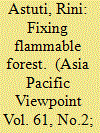

|
|
|
|
|
| Summary/Abstract |
Peatland fires and the impact of transboundary haze are often intertwined with socio‐environmental externalities of neoliberal forest governance and overlapping systems of resource property rights in Indonesia. New peatland governance strategies are emerging to address fires and haze by reorganising peatland management using a more ecologically relevant scale that territorialises peatland according to its hydrological characteristics. Employing the concept of the eco‐scalar fix, this paper interrogates rescaling peatland governance as a strategy to address the socio‐ecological crisis associated with the conversion of peatland into mono‐agricultural land. However, rescaling peatland governance entails the risk of merely displacing socio‐environmental crises to areas considered less ecologically important rather than addressing them. Drawing on a case study of a peatland restoration in Riau, Indonesia, this paper shows how emerging hybrid forms of peatland governance can address the environmental externalities that have unintentionally been created. This hybrid form of peatland governance has pressured actors across multiple types of property to rework the ways that environmental commons are controlled and accessed.
|
|
|
|
|
|
|
|
|
|
|
|
|
|
|
|
| 3 |
ID:
174823


|
|
|
|
|
| Summary/Abstract |
Currently approximately 9 million tons of plastic enter the world's oceans annually. This is a major transboundary problem on a global scale that threatens marine wildlife, coastal ecologies, human health and livelihoods. Our concern in this paper is with the environmental governance of marine plastic pollution that emanates from Thailand, the sixth biggest contributor globally. By zooming in on land‐based polluters in Thailand, we highlight both the systemic nature of the marine plastic problem and the relative impunity with which drivers of transboundary environmental harm function at all levels of governance. Drawing from 19 interviews conducted with actors from the public, private and non‐profit sectors, we examine three stages of the problem: production, consumption and waste management. We found that three major barriers prevent Thailand's government, private sector and citizens from engaging in the sort collective action needed to reduce marine plastic pollution. They are: (i) insufficient incentives to enact political change; (ii) scalar disconnects in waste management; and (iii) inadequate public and private sector ownership over plastic waste reduction. As the state alone cannot change corporate and consumer behaviour, we argue that multi‐stakeholder efforts across organisational scales of governance and administrative boundaries are needed to address the barriers.
|
|
|
|
|
|
|
|
|
|
|
|
|
|
|
|
| 4 |
ID:
174833


|
|
|
|
|
| Summary/Abstract |
At least 88 new hydropower dams are planned between 2010 and 2030 in the lower Mekong River basin in Southeast Asia as a source of electricity with lower greenhouse gas emissions. Dams result in declines in fish populations that will need to be replaced with other sources of protein for food security. We make the first assessment of emissions should beef production substitute for lost fish in Cambodia and Laos. We assessed two sources of emissions. Replacing lost fish with beef would require as much as 12 million hectares of new pasture. Forest clearing for pastures in Cambodia and Lao PDR would initially emit between 0.859 and 3.015 giga‐tonnes of carbon dioxide equivalents (Gt CO2‐eq.). Methane emissions from additional cattle would add at least 0.0013 Gt CO2‐eq./year to Cambodia's total greenhouse gas emissions, equivalent to a 20% increase. In Laos at least 0.0005 Gt CO2‐eq./year would be released, a 4–12% increase in annual emissions. We demonstrate that activities displaced by hydropower developments could significantly increase emissions. It shows how enclosure of commons at local scales impacts upon other common pool resources at different scales, raising questions for sustainable and equitable transboundary governance.
|
|
|
|
|
|
|
|
|
|
|
|
|
|
|
|
| 5 |
ID:
174816
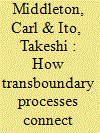

|
|
|
|
|
| Summary/Abstract |
In this paper, with a focus on Japan and Thailand, we outline a relational environmental and economic history of East Asian economic integration (EAEI) and its implication for the commons in both places. We draw attention in particular to global commodity chains as relational processes not only of trade and investment, but also geopolitics and aid, to argue that these transborder processes have connected together commons in distant localities resulting in their simultaneous enclosure, dispossession and (re‐)commoning with implications for community vulnerabilities in positive and negative ways. To demonstrate this argument we analyse three periods of EAEI: the late nineteenth century until World War II, when Japan and Thailand both began to modernise and new trade and geopolitical relations emerged in the context of colonialism; the post‐World War II recovery until the Plaza Accord in 1986, during which time Japan rapidly industrialised, as did Thailand to a lesser extent and regionalism was largely defined by US hegemony; and the post‐Plaza Accord period, when Japan deindustrialised its labour intensive manufacture and heavy industry and Thailand rapidly industrialised and EAEI became defined by new and intensified global commodity chains.
|
|
|
|
|
|
|
|
|
|
|
|
|
|
|
|
| 6 |
ID:
174813


|
|
|
|
|
| Summary/Abstract |
Increasing demands for energy to boost the Mekong economies have attracted the keen interest of riparian countries for hydropower development. This is evidenced by extensive investment in hydropower projects across the region over the last few decades. Drawing on interviews with key stakeholders, including officials from Ministry of Energy and Mines, Ministry of Natural Resources and Environment, Ministry of Agriculture and Forestry, private sector actors, civil society organisations and academics, as well as secondary data from public and policy resources, this paper aims to examine how the government of Laos' (GoL) decisions in hydropower development are influenced by regional energy dynamics, and how these shape the country's future energy development. The paper argues that the GoL's decisions on hydropower development are highly dilemmatic, given the current limited institutional capacity in hydropower governance and the accelerating evolution of alternative energy in neighbouring countries. While uncertainty in power markets is recognised, this places greater pressure on new hydropower projects as to how much power could be sufficiently produced and exported. The paper calls for GoL's policy considerations on the development and planning of alternative energy to secure the sustainable and equitable use of water resources as stipulated in the 1995 Mekong Agreement.
|
|
|
|
|
|
|
|
|
|
|
|
|
|
|
|
| 7 |
ID:
174847


|
|
|
|
|
| Summary/Abstract |
Education is one of the key objectives of, and means for, development. Its value is widely accepted though we rarely investigate the way different theories of development inform widely differing justifications and strategies for education. This article explores some of these issues and proposes five main paradigms regarding the education‐development nexus. These we term neoliberalism, retroliberalism, neostructuralism, place‐based and radical. Each is linked to particular concepts of development, each involves certain forms of education, and each is linked to particular policy discourses. Although these are largely abstract paradigms and in practice we see more hybridised forms co‐existing, we consider implications of each paradigm for education with examples from Oceania.
|
|
|
|
|
|
|
|
|
|
|
|
|
|
|
|
| 8 |
ID:
174838


|
|
|
|
|
| Summary/Abstract |
This article explores the relationship between I‐Kiribati communities and the broader ‘imagined’ Pasifika community in Aotearoa New Zealand. It looks at the way a group of I‐Kiribati tertiary students experience identity within this context. Through the use of semi‐structured interviews and a discourse analysis, the study draws three main conclusions. First, that I‐Kiribati navigate multiple identities and are constantly negotiating these within different spaces. Although this contributes to uncertainties around identity, I‐Kiribati students also strategically enact identity to suit various contexts. Second, that Pasifika as a term tends to infer ‘Polynesian’ which in turn may marginalise I‐Kiribati identities within certain spaces, particularly in education settings that intend to support all Pacific identities. Yet, given such a narrow understanding of Pasifika, these efforts may counter that intention for those on the margins of, or outside the common usage of, the term Pasifika. Last, community plays a significant role in the formation of identities within minority groups, which is important for countering aspects of marginalisation experienced within broader pan‐ethnic labels such as Pasifika. Consequently, we argue that Pasifika as a label needs to better reflect inter‐Pacific diversity as well as the identity negotiations that Aotearoa New Zealand‐born Pacific peoples navigate.
|
|
|
|
|
|
|
|
|
|
|
|
|
|
|
|
| 9 |
ID:
174811
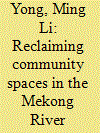

|
|
|
|
|
| Summary/Abstract |
In Northern Thailand's Chiang Khong district, which lies along the banks of the Mekong River and the Thai‐Lao border, an community‐based environmental movement under the leadership of the Rak Chiang Khong conservation group emerged in response to processes that have appropriated territories traditionally used by locals for state‐led economic exploitation. The Rak Chiang Khong has put up fierce opposition to large‐scale development projects such as the China‐led navigation project, which planned to blast ecologically and culturally significant rapids, and hydropower dam development along the Mekong River. As a result, local‐level governance arrangements of the transboundary commons in Chiang Khong have shifted to counter threats both within and beyond the borders of Thailand. Through adapting fishing arrangements, engaging in community‐led research and establishing village conservation zones, overlapping forms of territorialisation have emerged in response to socio‐ecological changes to the river. These new forms of territorialisation are produced by complex configurations of political, cultural, and ecological histories, politicaleconomic changes, and transboundary dynamics. These territorial strategies have been key towards reclaiming the transboundary commons of the Mekong River for riparian communities, and providing a deeper understanding of the values that drive community involvement in the transboundary environmental governance of the Mekong River.
|
|
|
|
|
|
|
|
|
|
|
|
|
|
|
|
| 10 |
ID:
174830


|
|
|
|
|
| Summary/Abstract |
Viewing the Salween River as a transboundary commons, this paper illustrates how diverse state and non‐state actors and institutions in hybrid and multi‐scaled networks have influenced water governance in general, and large dam decision‐making processes in particular. Putting power relations at the centre of this analysis and drawing on the conceptual lenses of hybrid governance and critical institutionalism, we show the complexity of the fragmented processes through which decisions have been arrived at, and their implications. In the context of highly asymmetrical power relations throughout the basin, and the absence of an intergovernmental agreement to date, we argue that hybrid networks of state and non‐state actors could be strategically engaged to connect parallel and fragmented decision‐making landscapes with a goal of inclusively institutionalising the transboundary commons and maintaining connected local commons throughout the basin, foregrounding a concern for ecological and social justice.
|
|
|
|
|
|
|
|
|
|
|
|
|
|
|
|
| 11 |
ID:
174852
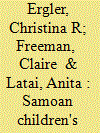

|
|
|
|
|
| Summary/Abstract |
Pacific Island communities are experiencing significant societal changes as a result of rural urban, inter‐island migration and migration to New Zealand. These relocations have significant implications for children's relationship to place. However, virtually nothing is known about children's sense of place in Samoa or places and activities that are important to them. This exploratory study worked with eight children aged 5–12 years growing up in an urban village in Samoa drawing on ‘Talanoa’ as research methodology and method by employing photo‐elicitation. The study provides a first snapshot of Samoan children's sense of place growing up in an urban village.
|
|
|
|
|
|
|
|
|
|
|
|
|
|
|
|
| 12 |
ID:
174808
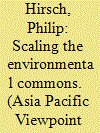

|
|
|
|
|
| Summary/Abstract |
The transboundary environmental commons in Southeast Asia are normally conceived in terms of shared resources and environmental impacts that transcend national borders. The Mekong's ‘fugitive resources’ of water, fish and sediment and the issue of Indonesia's smoke haze drift into Malaysia and Singapore dominate discussion. Assumed national interests shape actors and institutional arrangements for transboundary commons governance. Failure to address the governance challenges is explained in terms of their politico‐cultural failings (e.g. the ‘ASEAN Way’ of non‐interference), the weak regulatory remit of agencies with a specific transboundary governance role (Mekong River Commission), the dominant developmental agenda of subregional cooperative arrangements (Greater Mekong Subregion) or the geopolitical dominance of China (Lancang–Mekong Cooperation). This article builds on these critiques by considering the relationship between the local commons impacted by transboundary projects and the framing of the commons at an inter‐governmental level. It shows that neglect of the local commons and the impacts on them of projects with transboundary effects is partly to be explained by the institutional scaling of the transboundary commons at a country‐to‐country level. It also argues for an expanded notion of transboundary, including investment and governance flows as well as the material environmental footprint of large‐scale investments.
|
|
|
|
|
|
|
|
|
|
|
|
|
|
|
|
| 13 |
ID:
174843


|
|
|
|
|
| Summary/Abstract |
This article examines the lives of Port Moresby women who work in the development sector of Papua New Guinea. In particular, it demonstrates how development discourse structures the very fabric of working relationships within this sector in Port Moresby. Underpinned by neocolonial geographies in which those in the global north rescue those in the global south, these discourses produce workplaces in which Papua New Guinean women are seen as lacking the moral and technical capacities to run development projects in their own country. The article argues that the privileges held by expatriates and denied to local women, in conjunction with the workplace discrimination to which they are subjected, ironically undermine the development sector's supposed commitment to promoting gender equality in Papua New Guinea.
|
|
|
|
|
|
|
|
|
|
|
|
|
|
|
|
| 14 |
ID:
174820


|
|
|
|
|
| Summary/Abstract |
This paper focuses on the ‘the unseen transboundary commons’ of residues, nutrients and mobile matter associated with the annual flood pulse that support Cambodia's inland fisheries. We develop the idea of biophysical geopolitics concentrating on political‐socio‐natures rather than the purely biophysical. In the context of multiple mega‐projects in the Basin, we argue the flood pulse has become increasingly compromised, which is an urgent socio‐ecological security issue facing the Mekong region. Scores of livelihoods are dependent on the hydrological flood pulse via the reproduction of the inland fisheries, and a diversity of wetlands resources. Our paper builds on cross‐comparative research focusing on a geo‐strategic mouth of the Tonle Sap (Chhnok Tru) and a transborder area along the Mekong main‐stream (Stung Treng, Cambodia – Champasak, Laos area). By viewing biophysical matter as becoming trans‐border geopolitical matter, we wish to emphasise the critical socio‐ecological character of the hydrological flood pulse, and the urgency of cumulative spatial and temporal changes affecting diverse wetlands communities. Loss of wild capture fisheries and the more unpredictable flows of the Mekong are signs of an emergent and dangerous era of increasing environmental insecurity.
|
|
|
|
|
|
|
|
|
|
|
|
|
|
|
|
| 15 |
ID:
174841


|
|
|
|
|
| Summary/Abstract |
Fishing constitutes a key source of income and food for rural communities worldwide. This is the case in predominantly rural Myanmar (World Fish, 2019), particularly in the Ayeyarwady (Irrawaddy) River Delta. Fishing has long been a central livelihood strategy and valuable source of food security in the Delta, and now also generates a substantial contribution to the gross domestic product. However, the livelihood practices of the fishers, particularly small‐scale fishers, are largely ‘invisible’ in the literature and policy. In this article, we advance understanding of the significant but understudied livelihoods of small‐scale fishers through interviews with fishers and a range of other actors in 2018. Taking a careful examination of the challenges, practices and responses of fishers in the Delta, our research underlines that fishers are important actors in the ‘making’ of the Delta as a geographical scale and concept, yet they are being pushed out of the very landscape they have helped co‐create and have lived in for generations. At this crucial point in Myanmar's development and change, we contend that a better understanding of the livelihoods of fishing households, as some of the nation's most vulnerable, is important for inclusive policy development, economic reforms and research strategy going forward.
|
|
|
|
|
|
|
|
|
|
|
|
|
|
|
|
|
|
|
|
|